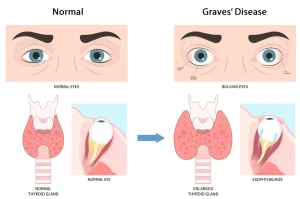Overview
Graves’ disease is an autoimmune disorder that causes hyperthyroidism, a condition in which the thyroid gland produces excessive thyroid hormones. It is one of the most common causes of an overactive thyroid and primarily affects the metabolism, heart, and other body systems. The disease is more common in women and typically occurs between the ages of 30 and 50, though it can affect people of all ages.
Symptoms
-
Rapid heartbeat or palpitations
-
Unexplained weight loss despite normal or increased appetite
-
Increased sweating and heat intolerance
-
Tremors in the hands or fingers
-
Anxiety, irritability, or nervousness
-
Fatigue or muscle weakness
-
Swelling at the base of the neck due to enlarged thyroid (goiter)
-
Bulging eyes (Graves’ ophthalmopathy)
-
Changes in menstrual cycles in women
-
Difficulty sleeping
Causes
Graves’ disease occurs when the immune system produces antibodies called thyroid-stimulating immunoglobulins (TSIs). These antibodies trigger the thyroid gland to produce more hormones than the body needs. The exact cause of the immune system malfunction is unknown, but it may be influenced by:
-
Genetic predisposition
-
Viral or bacterial infections
-
Stress or environmental factors
-
Smoking, which increases the risk of eye-related complications
Risk factors
-
Gender: Women are more likely to develop Graves’ disease than men
-
Age: Most commonly affects people between 30 and 50 years
-
Family history: Having close relatives with thyroid disease or other autoimmune conditions
-
Other autoimmune disorders: Conditions like type 1 diabetes, rheumatoid arthritis, or lupus can increase risk
-
Stress and smoking, particularly in relation to eye complications
Complications
If untreated, Graves’ disease can lead to serious health problems, including:
-
Heart problems such as rapid heart rate, atrial fibrillation, or heart failure
-
Thyroid storm, a rare but life-threatening condition with extreme hyperthyroidism
-
Osteoporosis due to long-term excessive thyroid hormone levels
-
Eye problems, including vision loss in severe cases
-
Skin thickening, typically on the shins (pretibial myxedema)
Prevention
There is no guaranteed way to prevent Graves’ disease because it is an autoimmune condition. However, certain measures may help reduce risk or manage early symptoms:
-
Regular thyroid check-ups if there is a family history of thyroid disorders
-
Avoiding smoking
-
Managing stress through relaxation techniques, exercise, or counseling
-
Prompt treatment of thyroid-related symptoms to prevent complications
Graves’ disease is manageable with medications, radioactive iodine therapy, or surgery in severe cases. Early diagnosis and consistent treatment improve outcomes and quality of life.
Advertisement

